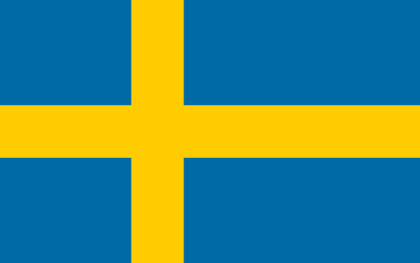Sweden
Updated:
7 Sep 2020

Explore here
Sweden (Sverige ), officially the Kingdom of Sweden (links=no ), is a Nordic country in Northern Europe. It borders Norway to the west and north, Finland to the east, and is connected to Denmark in the southwest by a bridge-tunnel across the Öresund Strait. At Sweden is the largest country in Northern Europe, the third-largest country in the European Union and the fifth largest country in Europe by area. The capital city is Stockholm. Sweden has a total population of 10.3 million Persons who have foreign backgrounds are defined as persons who are foreign born, or born in Sweden with foreign born parents. It has a low population density of and the highest urban concentration is in the central and southern half of the country. Sweden is part of the geographical area of Fennoscandia. The climate is in general mild for its northerly latitude due to significant maritime influence. In spite of the high latitude, Sweden often has warm continental summers, being located in between the North Atlantic, the Baltic Sea and the vast Eurasian Russian landmass. The general climate and environment varies significantly from the south and north due to the vast latitudal difference and much of Sweden has reliably cold and snowy winters. Southern Sweden is predominantly agricultural, while the north is heavily forested and includes a portion of the Scandinavian Mountains. Germanic peoples have inhabited Sweden since prehistoric times, emerging into history as the Geats (Swedish Götar) and Swedes (Svear) and constituting the sea peoples known as the Norsemen. An independent Swedish state emerged during the early 12th century. After the Black Death in the middle of the 14th century killed about a third of the Scandinavian population, the Hanseatic League threatened Scandinavia's culture, finances and languages. This led to the forming of the Scandinavian Kalmar Union in 1397, which Sweden left in 1523. When Sweden became involved in the Thirty Years War on the Reformist side, an expansion of its territories began and eventually the Swedish Empire was formed. This became one of the great powers of Europe until the early 18th century. Swedish territories outside the Scandinavian Peninsula were gradually lost during the 18th and 19th centuries, ending with the annexation of present-day Finland by Russia in 1809. The last war in which Sweden was directly involved was in 1814, when Norway was militarily forced into a personal union, which peacefully dissolved in 1905. Since then, Sweden has been at peace, maintaining an official policy of neutrality in foreign affairs. In 2014, Sweden celebrated 200 years of peace, breaking even Switzerland's record for peace. Sweden was formally neutral through both world wars and the Cold War, albeit Sweden has since 2009 openly moved towards cooperation with NATO. Sweden is a constitutional monarchy and a parliamentary democracy, with Legislative power vested in the 349-member unicameral Riksdag. It is a unitary state, currently divided into 21 counties and 290 municipalities. Sweden maintains a Nordic social welfare system that provides universal health care and tertiary education for its citizens. It has the world's eleventh-highest per capita income and ranks very highly in quality of life, health, education, protection of civil liberties, economic competitiveness, income equality, gender equality, prosperity and human development. Sweden joined the European Union on 1 January 1995, but declined NATO membership, as well as Eurozone membership following a referendum. It is also a member of the United Nations, the Nordic Council, the Council of Europe, the World Trade Organization and the Organisation for Economic Co-operation and Development (OECD).